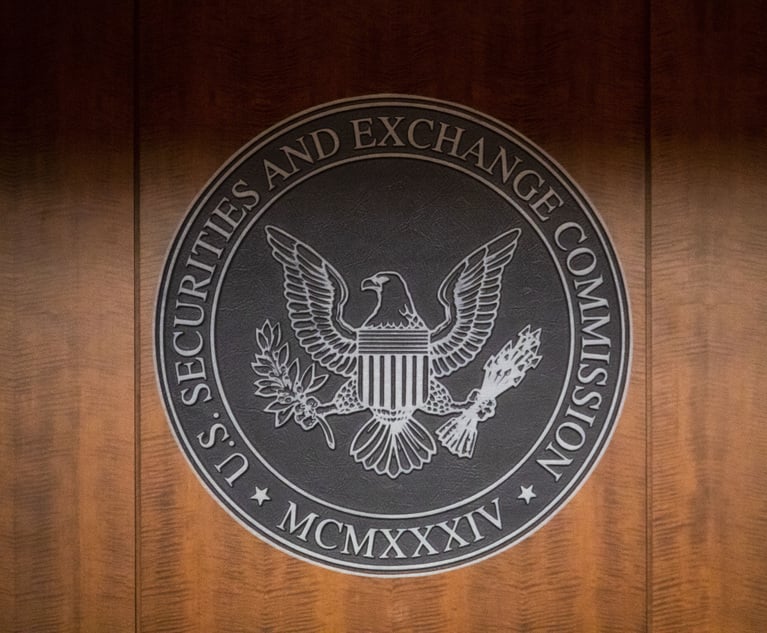 Employers should expect to see a big wave of enforcementactions from the federal Equal Employment Opportunity Commissionover the next few months, as the commission ramps up its effortsahead of its fiscal year-end on Sept. 30.
Employers should expect to see a big wave of enforcementactions from the federal Equal Employment Opportunity Commissionover the next few months, as the commission ramps up its effortsahead of its fiscal year-end on Sept. 30.
The EEOC traditionally brings a raft of cases toward the end ofthe fiscal year, as Congress considers the budget, says ChristopherDeGroff, a partner in the Chicago-based law firm of Seyfarth &Shaw. He warns that companies need to take steps now so as not tobe caught up in those actions, which can be both costly anddamaging to a company's reputation.
|An EEOC spokeswoman, Justine Lisser, confirms that the agency,charged with enforcing laws against employment discrimination andharassment, historically has piled it on toward year's end, but shepredicts that will change in coming years. “Starting next year, youwill see the agency charging out of the box from the beginning,”she says.
|DeGroff, pictured at right, predicts that this fall'senforcement actions will focus on discrimination in hiringpractices, as well as discrimination against and harassment ofimmigrant employees.
|Commissioners have “said they will be looking closely at hiringdiscrimination,” he says, adding that one reason could be that suchcases are not as lucrative for private attorneys as are on-the-jobdiscrimination cases. “Also, with such high unemployment in thecountry right now, access to jobs is a big issue.”
|Indeed, last Wednesday, at an EEOC publicmeeting on developing a strategic plan for attacking employmentdiscrimination, there were many calls for the commission to focuson both hiring discrimination and the harassment and abuse ofimmigrant employees.
|“As our economy struggles to recover from recession andAmericans slowly go back to work, it is important that theCommission continue to shine a light on employer policies andpractices that exclude workers from consideration for employment,”said Fatima Goss Graves, a member of the employment task force ofthe Leadership Conference on Civil and Human Rights.
|DeGroff says companies can avoid being targeted by the EEOC by arigorous process of self-auditing. “Take a look at your applicantflow and who you are hiring, and be sure you have a goodexplanation if the numbers don't add up.”
|One flag for EEOC investigators is employment testing. “Doesyour testing really apply to the jobs on offer?” DeGroff says. “Ifyou give someone a pencil-and-paper test and they're applying for ajob as janitor, it wouldn't be appropriate, and the EEOC will cryfoul.”
|Many companies get in trouble because executives with hiringauthority are discriminating in violation of company policy,DeGroff says. “The best practice there is to have the rightpolicies and to monitor to be sure that the policies are beingfollowed.”
|The EEOC is looking for high profile cases, in part because suchcases get media attention. “The media element of these cases cannotbe overstated,” he says.
|Big discrimination settlements, in addition to being costly, canseriously damage a company's reputation. “For the EEOC, which is avery political animal, sometimes getting media attention is aprimary objective,” DeGroff warns.
|For previous coverage of the EEOC, see UnemployedNot Wanted? and LayoffsSpur Lawsuits.
|Complete your profile to continue reading and get FREE access to Treasury & Risk, part of your ALM digital membership.
Your access to unlimited Treasury & Risk content isn’t changing.
Once you are an ALM digital member, you’ll receive:
- Critical Treasury & Risk information including in-depth analysis of treasury and finance best practices, case studies with corporate innovators, informative newsletters, educational webcasts and videos, and resources from industry leaders.
- Exclusive discounts on ALM and Treasury & Risk events.
- Access to other award-winning ALM websites including PropertyCasualty360.com and Law.com.
*May exclude premium content
Already have an account? Sign In
© 2024 ALM Global, LLC, All Rights Reserved. Request academic re-use from www.copyright.com. All other uses, submit a request to [email protected]. For more information visit Asset & Logo Licensing.







